How the Coronavirus and the Economic Crisis of 2020 Will Influence the Mobile App Industry
An unexpected pandemic is wreaking havoc on the global economy, businesses, and our individual lives. How will it affect the mobile app industry and your business specifically? Let’s find out
While countries shut down and people reduce their spending in anticipation of the world economic collapse, businesses struggle to stay afloat. Most mobile businesses and startups are no exception, although some categories of mobile apps are actually seeing increased profits.
Still, the global mobile app industry will face long-lasting changes in terms of technology, marketing, and service as a result of the COVID-19 pandemic and the current world economic crisis. In this article, we’ll talk specifically about the effect on mobile applications.
How will the coronavirus impact the mobile app industry and mobile development in general? In this article we’ll discuss new app industry trends that are likely to stay even after the crisis is over, mobile apps trends 2020, and we’ll make an overall app industry overview.
Current impact on the mobile industry
The impact of COVID-19 on the mobile app industry has been as drastic as on other industries, with some companies thriving and others struggling or shutting down altogether.
At the beginning of April 2020, the scooter sharing company Bird laid off 406 people in just two minutes during a Zoom webinar, which seems more like a company liquidation than a layoff.
Scooter sharing and travel applications have seen a nearly 40% decline in downloads between February and March 2020, according to mobile app development industry statistics from Appfigures.
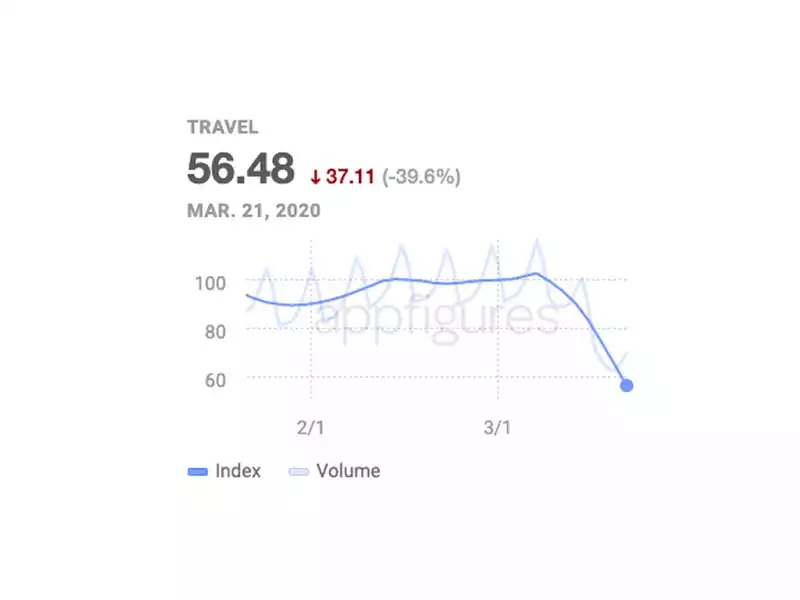
To see how ridesharing will probably suffer across the world, here’s an example of how COVID-19 hit the ridesharing app market in China back in February 2020:
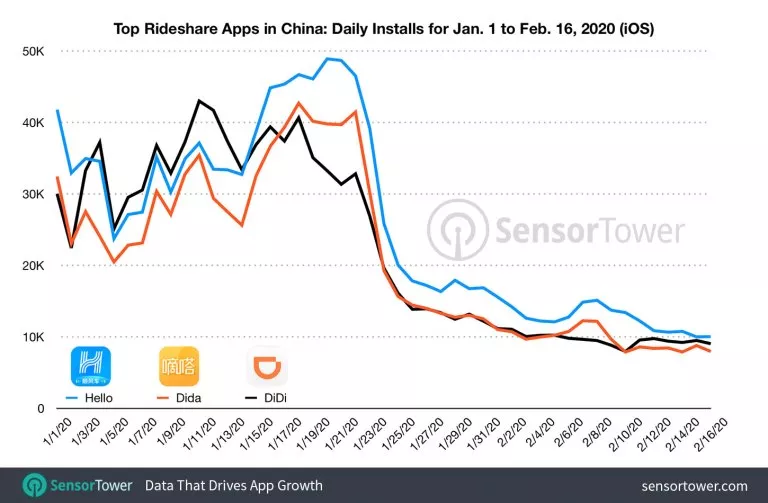
However, the mobile app industry as a whole is doing fine, as people are turning to their mobile devices even more during the global shutdown, using mobile apps for both work and entertainment. Look at this app industry stats:
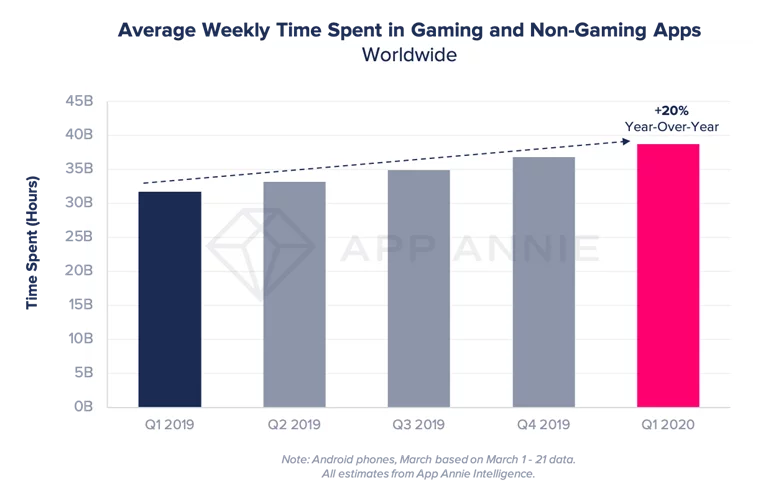
According to App Annie app industry statistics, the average time people spend in mobile apps has increased 20% between Q1 2019 and Q1 2020. Consumer spending in apps hit a record $23 billion in the first quarter of 2020, with $15 billion being spent on the App Store and $8.3 billion on Google Play. Most of this spending was related to mobile games, but other types of applications also saw their share of revenue.
Zoom has seen amazing success during the quarantine period, as most businesses have started working remotely and need a tool for effective communication. The number of daily active Zoom users reached 200 million in March 2020; compare that to just 10 million in December 2019!
On the whole, business apps like Zoom and Skype saw an over 200% increase in downloads in March 2020:
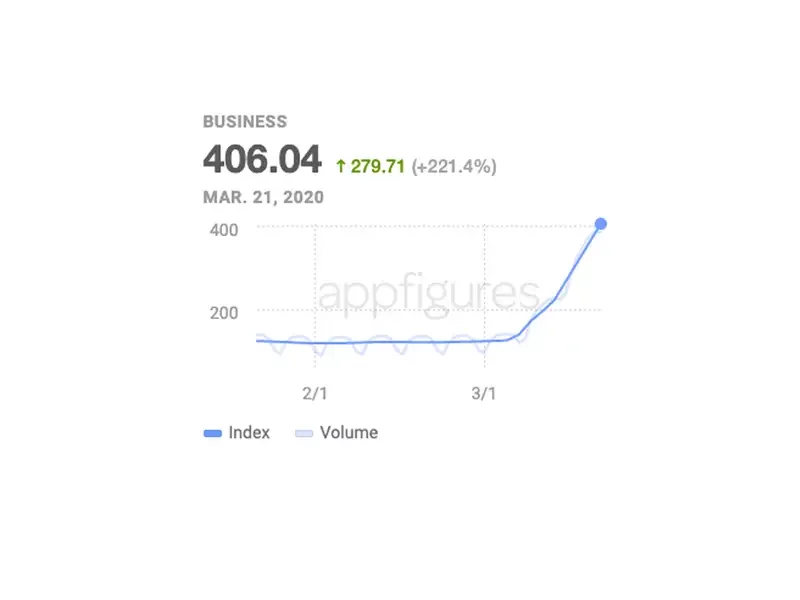
The impact of the coronavirus pandemic on ecommerce businesses varies widely depending on the types of products sold. Fashion retail apps have seen a significant decline in sales (41% in France and 27% in the US, for example), while mobile app growth for supermarket and food delivery apps is there in both downloads and sessions.
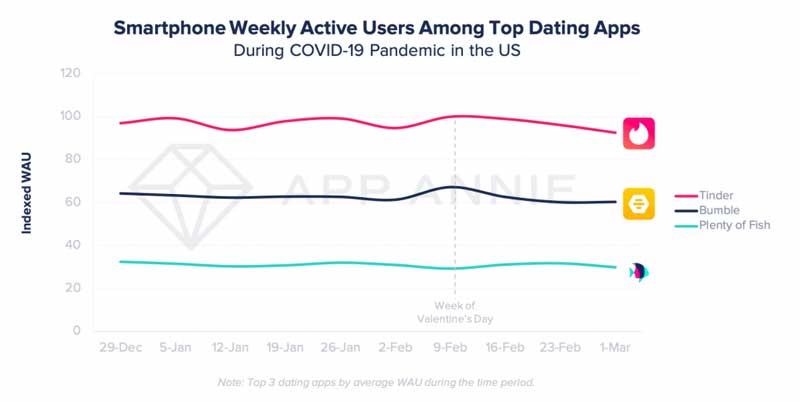
In Italy, YouTube has experienced a 20x increase in the average watch time. Other video streaming apps like Netflix are even lowering video quality to be able to meet the increased demand.
Social media is also on the rise, as 45% of users have started spending more time on their Facebook, Instagram, and Twitter accounts compared to before the pandemic. So as you can see, mobile applications are mostly experiencing an increase in traffic during the coronavirus pandemic, serving as sources of entertainment and tools for work. Let’s sum up the types of apps that will likely survive the crisis and those that may lose their audiences until it’s over.
Categories of apps that see increased demand during the pandemic and will likely survive the 2020 economic crash:
- Dating
- Social media
- Telemedicine
- Online education
- Mobile games
- Online conferencing
- Video and music streaming
- Health and fitness
Struggling app categories:
- Travel
- Ridesharing
- Retail
Emerging mobile app trends
1. Reliance on FinTech
As physical bank branches are closed, more and more people are relying on FinTech products. Online shopping and the tendency to cut down personal interactions will also make FinTech more popular during quarantine.
If your mobile app still doesn’t have a payment gateway, you should definitely implement one as soon as possible. If it does, make sure your current payment service supports as many payment options as possible.
2. Products for remote work
Mobile applications that enable remote communication for employees are showing rapid growth. As more companies start working remotely, they’ll need platforms for this.

Because of privacy and security concerns, not all companies will choose Zoom or other similar products. It’s vital to create highly secure and scalable mobile and web products for remote work that will be able to handle large volumes of traffic.
Some companies are even choosing to create their own secure enterprise tools for communication. For example, Mobindustry is currently working on a private secure chat app like Slack that has video conferencing features.
3. Delivery services
With a total lockdown in many cities, businesses that have never delivered are starting to expand and transform their services. This includes restaurants, which are trying to stay in business by delivering meals directly to customers.
The coronavirus outbreak has shown how important delivery is, and our prediction is that many restaurants will continue to deliver even after the quarantine is over. For this, they’ll need convenient mobile applications where users can make orders and pay for them instantly.
4. Better monitoring with big data and IoT
Several apps for coronavirus tracking have already emerged. The development of some of them was initiated by governments that use these applications to inform people of the virus’s spread, track those who should isolate themselves, and help users determine their symptoms.
The COVID-19 pandemic isn’t the first and certainly won’t be the last in the history of humanity, but it’s the starting point for many applications that will help us more effectively inform the public, track the spread of disease, and help people prevent pandemics in the future. Mobile technologies like GPS and IoT will play a significant role in tracking the disease spread.
5. Telemedicine
Telemedicine is currently the only way for many people to access the overloaded healthcare system. Hospitals are busy with coronavirus patients and don’t recommend that individuals come to them unless they’re experiencing severe symptoms.
Telemedicine is one of the best ways to get help from a doctor without getting out of the house and risking getting infected. Most clinics are opening telemedicine consultations, and the demand for secure telemedicine apps that are compliant with data protection legislation like HIPAA will only increase. That’s no surprise, that the growth in mobile application software for telemedicine is predicted to go up significantly.
6. Online shopping
Most shopping is now done online, even when it comes to groceries, so most physical retailers that haven’t done so already will need to come up with a way to sell their products online.
Mobile applications are the most convenient way to shop, and even after the pandemic is over, most businesses will maintain their own platforms for online sales to stay competitive.
7. The rise of esports and elearning
Not only businesses but also entertainment and education have moved online because of the coronavirus outbreak. The esports industry showed significant growth before the pandemic and will become even more powerful while everyone is in quarantine.
Elearning platforms are also seeing an increase in traffic, and many are now making special offers and giving free access to courses to grow their audiences. Whether they’ll keep those audiences after the pandemic depends on the retention strategy of each business. A mobile application can help with that by taking advantage of push notifications.
How software development will change
The app development industry is very decentralized, and many companies already outsource their product development to companies in other countries. In response to the COVID-19 pandemic, companies will continue working remotely with their vendors; however, in-person meetings and business trips won’t be possible.
For companies who have in-house development teams, quarantine may be a challenge, as they’ll need to quickly establish a strategy for remote work. Those who fail to do so will see a significant decrease in productivity.
Whether remote work is productive depends on the company’s strategy and employees’ remote working skills
On the whole, the pandemic will have three major consequences for software development companies and their clients.
1. Fewer face-to-face interactions
For the foreseeable future, all business trips are cancelled, so remote development teams have no opportunity to meet their clients in person. However, most development still happens remotely and will continue as usual. Zoom meetings won’t be able to substitute in-person meetings entirely, but they’re still a good alternative for productive communication.
2. More outsourced projects
Many companies will outsource their development processes or create outstaffing teams to optimize their expenses on development. As the whole world works remotely, it will become vital to find a company that’s able to communicate effectively not only with their clients but within their own team.
The companies that manage to work remotely and keep it productive will be the leaders of the mobile application development industry.
3. Remote work within development companies
Though outsourcing development companies are used to working remotely when it comes to interacting with clients, most still have offices and work as a team in one building.
Currently, most IT specialists in Ukraine are working from home. Whether this work is productive depends on the company’s strategy and employees’ remote working skills.
How is Mobindustry handling the situation?
Mobinudstry is currently taking all necessary measures to protect our team from the coronavirus. We keep our office available and safe for employees but encourage remote work.
Every member of the Mobindustry team is currently working remotely from home. However, we’re working at the same pace and during the same hours. Members of our delivery team are having the same number of meetings and daily standups to keep everyone on the same page.
Mobindustry has strong remote working skills and provides the same level of service quality as before the outbreak
Also, to keep our clients updated at all times, we send them daily and weekly reports on what has been done and what’s planned for the next week.
At Mobindustry, employees had the possibility to work remotely even before the coronavirus outbreak, so it’s not much of a challenge for us to work fully remotely now. We’re doing our best to provide the same level and quality of service to our clients during this period of quarantine.
Final thoughts
The coronavirus has left the world with lots of questions: How will the pandemic influence the mobile market? Is the economy going to crash? Which businesses will make it and which will fail? What are the market trends for mobile apps?
We’ve tried to answer some of these questions in this article and made a mobile app market analysis. For sure, the quarantine will affect all businesses, both physical and digital. However, those that have a strong digital presence will suffer less and will be able to stay afloat. Some will even grow during the crisis if they’re able to meet the demand.
Businesses that provide digital means for delivery, education, entertainment, communication, and mental and physical healthcare will be able to grow their audiences and survive the 2020 financial crisis. Their next challenge will be to keep those new users after the crisis is over.
Some experts say the world won’t ever return to what it used to be and that the crisis will be the start of a new world characterized by new ways in which people interact with businesses, consume products, and so on. The iOS and Android app market will need to keep that growth after the pandemic ends.
If you want to stay relevant during and after the crisis, it’s vital to strengthen your digital presence. To do so, consider outsourcing. It’s a good way to cut costs without sacrificing quality and quickly join the mobile application market trends.


